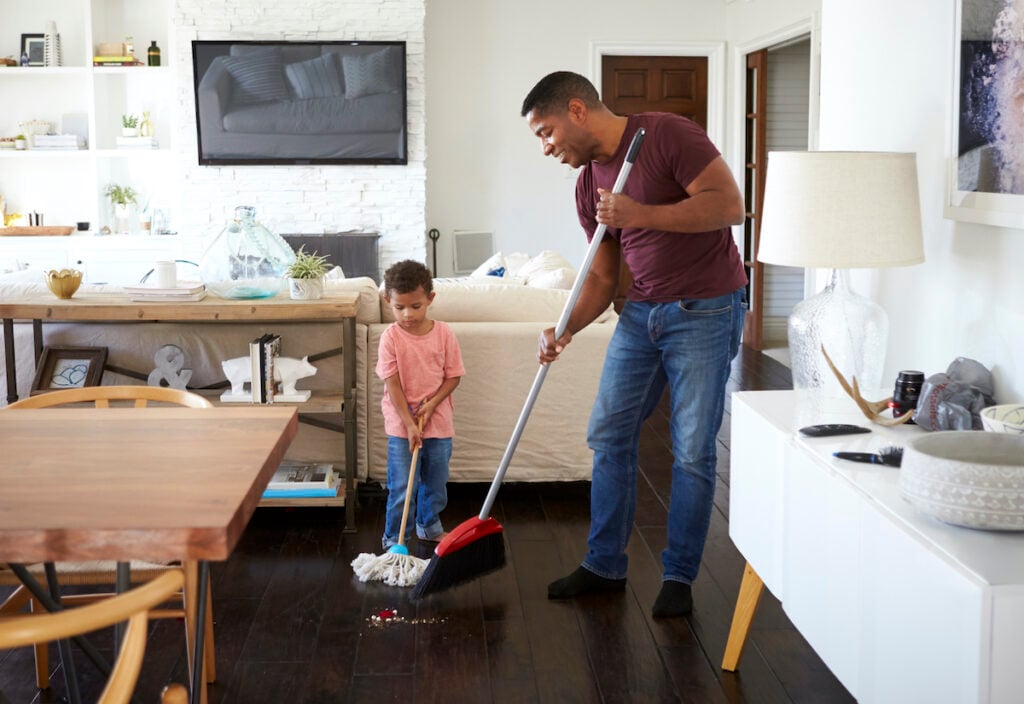Age Appropriate Chores for Kids: Chores List by Age
Kids of all ages can reap great rewards for helping out around the house. In fact, many children, as young as toddlers, actually want to help. The trick is finding the right chores for kids that match their capabilities.
Find out which chores are important for children to learn plus a list of age-appropriate chores to participate in the household.

The Benefits of Age-Appropriate Chores for Kids
Whether they’re assigned in the form of a chart, a wheel, or a jar… age-appropriate chores play an important role among families. Not only do regular household jobs teach kids responsibility and prevent a sense of entitlement, but they also instill in children a vital sense of importance in the family.
When kids are able to participate in the workings of a household in meaningful ways, they internalize a powerful message: “My contributions matter; I matter here.” This feeling of significance is a cornerstone of successful family relationships.
The thing is, getting kids to do household tasks can be a challenge. They don’t exactly jump for joy at the prospect of vacuuming or doing laundry. A chore chart works great for some kids.
Children don’t have quite the same priorities as parents do, and they’re certainly not proactive about getting housework finished. When it comes to household chores, there is often so much nagging involved that parents frequently resort to yelling, threatening, bribing, or just doing jobs themselves because it’s easier than enduring another power struggle.
If this sounds familiar, here are a few principles to incorporate into your approach to age-appropriate chores that will both help kids learn responsibility as well as foster a strong, positive relationship between the two of you.
1. Take Time to Teach
Learning to keep up with chores is not something a child learns quickly. While seemingly straightforward to the adults who do them all the time, household tasks take weeks, months, or even years for kids to learn and develop habits. Depending on the job, be sure to take adequate time to teach kids what needs to happen and how to do it.
This may mean you have to start from the beginning each time you ask your kids to clear the table after dinner, reminding them of what items need to go in the fridge, back in the drawers, or in the pantry.
Remember that kids’ priorities are different from parents’, so have patience when a child seems to have “forgotten” what to do.
The most important element for long-term success is time.
2. We Do it Together (Until You Can Do it Alone)
Teaching chores is much more effective when it is done cooperatively. Engage children in the learning process with these four steps:
- Model. First, just demonstrate how a task is done.
- They help you. Next time you do the job, you get to have an assistant.
- You help them. Now it is their turn to take the lead, and you are the assistant.
- They do it alone. You’ve done this work together enough times that it is reasonable to expect a child to get a job done on her own.
The length of time necessary for this 4-step process varies. Feeding the pets is much less complicated than cleaning their bedroom.
For big tasks like that, it helps to break the job up into steps:
- Put toys away
- Pick up clothes
- Make the bed
- Toss any trash
- Dust surfaces
- Vacuum
Each of these steps has its own learning curve.
That’s why it’s overwhelming to say to a child, “Clean your room,” and expect it to be done both quickly and without guidance. Teach your child how to do it well by teaching in small steps, engaging cooperatively with them, and giving them plenty of time to develop this skill.
What if a child argues when it’s time to do chores?
Your response is, “Let’s do it together.” Stick with the gentle discipline practices you’ve been following all along. Even when children have previously been able to do tasks on their own, sometimes they just need extra encouragement or help.
Break the job into, “You do this and I’ll do that.” No arguing, negotiating, reasoning, bribing, or threatening necessary — just cooperation, supervision on your part, and some re-teaching. Your motto is, “We do it together (until you can do it alone).”
3. The “When / Then” Approach
What if a child is old enough to not need to be re-taught how do to simple tasks and is more than capable of doing them alone? The When / Then approach is useful for moments like this.
- When the books are put back on the shelf, then you may go to your friend’s house.
- When the living room is picked up, then we’ll start the movie.
- When the hamster cage is cleaned, then you can go outside.
The When / Then approach is not a bribe, as it does not offer kids a reward if they do their work. It is about teaching kids that work is a necessary part of the day and sometimes it has to come before the fun stuff. It’s an order of events versus a conditional reward.
Kid’s Chores FAQs
As you can see from the chores by age below, children can start doing chores at a very young age, even 2 or 3. Of course, it is important to give them developmentally appropriate tasks. Use the guide below, but always take into consideration your own child’s capabilities and temperament. Each child develops at their own pace, so meeting them where they are is what is most important.
The routine is queen! This will vary for each family individually, but kids tend to thrive on structure and routine. Whichever tasks are building your child’s confidence, self-esteem, and independence should be prioritized. This will change with each age and stage, but daily tasks can grow with them, for instance preparing and cleaning up dinner are great daily chores for any age child.
Household tasks and responsibilities are appropriate for all ages! Each age can learn, grow, and build life skills as well as executive function capabilities, and confidence with each task they learn to capably do.
Again, this will vary from family to family. However, routine is helpful for all ages of children. Especially for tweens and teens, if it’s already part of the daily routine it can help reduce arguments. Chores are a part of daily life for all people, so get your kids involved!
Chores By Age
Here are some guidelines for the kinds of chores kids are capable of handling alone at different ages after dedicating some time to teaching. The nature of these tasks is unique to each child, family, and situation.
When assigning chores for kids, be sure to take into consideration their individual needs and capabilities.

Chores for 2 and 3-Year-Olds
Typically this age loves to feel independent, so giving them chores they can safely do on their own is a great way to boost their self-esteem while building developmental skills.
This is a great age to get them into a routine, for instance cleaning up after dinner. Let them do their chores while everyone else is cleaning up too. Give them a dry cloth to dust and a wet washcloth to wipe tables.
Other good chores for 2-year-olds and 3-year-olds are to stand on a stool at the sink and wash fruit and veggies, sweep the floor, put their dirty clothes into the hamper, unload utensils from the dishwasher, and help sort and load laundry. If your tot loves independence (most do!), on their own they can choose their clothes for the next day, and put their toys away.
Chores for 2-3 Year Olds
- Help clean up after meals
- Dust
- Wash fruits and veggies
- Sweep
- Put their dirty clothes into a hamper
- Unload utensils from dishwasher
- Help sort and fold laundry
- Put toys away
- Choose their own clothes
Will any of these household tasks be done perfectly? Probably not, BUT your child will feel included, important, and independent, and will be learning to build a routine as they do so.
Chores for 4 and 5-Year-Olds
Kids that are 4 and 5 can be very capable helpers. Including them in the household rhythms with chores that are repeated regularly is a good way for them to feel responsible, which is important for their self-esteem and confidence.
Let them don their fairy wings, pretend they’re a cat, or pack their dolly’s on their back to do their chores. Imagination and play will help get the job done for preschoolers.
Family-centered chores like setting the table, preparing simple foods, and clearing the table after a meal are all tasks perfect for this age to conquer. Learning is easy when it’s a daily chore.
Feeding the pets, watering plants, cleaning up spills, and making their bed every day are all developmentally appropriate chores too. Have them put books away on the shelf, and on laundry day they can be in charge of pairing up and folding socks.
Chores for 4-5 Year Olds
- Any chores from younger lists
- Set the table
- Help prepare meals
- Clear the table after meals
- Feed pets
- Water plants
- Make bed
- Put books away
- Pair up and fold socks
- Clean up their messes (within reason)
Cat ears and fairy wings are optional, but recommended!
Chores for 6 and 7-Year-Olds
By 6 and 7 years old, most kids can ride a bike, are losing teeth, and are learning to write and read. It can be a very transformative age! Perhaps a bit less dreamy and a little more serious, kids of this age can handle more responsibility. If they can reach it, they can probably do it.
A little taller and a lot stronger, this age of children can take on their own list of household tasks like taking out the trash, vacuuming rugs, and folding laundry.
In the kitchen, task them with peeling vegetables, measuring ingredients, and making sandwiches. If you live in a safe area, they can go get the mail, and have them be responsible for cleaning the animal cages and the bathroom sinks.
If they can read or use a picture list, have a 6 or 7-year-old pack their own suitcase for a trip. It’s a perfect way for them to be independent and feel capable. Be sure to double check their suitcase and explain anything they may have left out and why it’s important to bring.
Chores for 6 and 7-Year-Olds
- Any chores from younger lists
- Take out trash
- Vacuum
- Fold laundry
- Peel vegetables
- Measure ingredients
- Make simple meals
- Collect the mail
- Clean animal areas or cages
- Clean bathroom sinks
- Pack their own suitcase
- Rake leaves
- Weed garden
Kids this age can weed a garden and rake leaves too. They are full of curious energy, and tons of emerging skills. And you might find them excited to develop a good work ethic.
Chores for 8 and 9-Year-Olds
With a leap in increased attention span and a more keen sense of the world, 8 and 9-year-olds have a jump in independence developmentally. Not quite tweens, but still intensely interested in their friends, this age group may need a little more motivation. A chore list helps some families!
At this age, kids have the capability to unload and put away groceries, load the dishwasher, pack their own lunch for school, and mop the floor. Many children can bake on their own at this age too.
Now that they have mastered cleaning bathroom sinks, they can take on other household tasks in the bathroom like scrubbing the toilets and cleaning the bathtub. On laundry day, have them help load the washer or dryer and put their own clean clothes away. Some kids really like to organize themselves, it’s a great life skill!
Chores for 8 and 9-Year-Olds
- Any chores from younger lists
- Pack their own lunch
- Mop floors
- Unload and put away groceries
- Bake
- Load the dishwasher
- Clean the bathroom
- Laundry
- Organizing
- Walk the dog
- Clean their room
- Help with yard cleanup
Send them out to walk the dog, sometimes letting a friend go along is very motivating at this age. On yard day, they can plant their own garden too which has wonderful long-term rewards!
Chores for Kids Aged 10+
This is the age group when kids reach so much more developmental maturity, although their focus on growth is very social and emotional. Their capabilities to do household tasks are very high, however, the ability to self-manage, internally motivate, and plan time for chores tends to be more of a challenge.
When it comes to chores like doing their own laundry, have them set a weekly reminder on their phone or calendar. Sometimes natural consequences like not having clean clothes can motivate them to remember, but that varies greatly depending on the child.
Developmentally, the skill building here is to plan and manage a chore. What one child may be able to handle at 10 years old, may turn into mush when they’re 15! This is when external reminders like a family chore app or a phone alarm are super helpful. Just the same as when they were small, their confidence is built by completing these tasks independently.
Kids in this age group can capably plan a meal and use the stove. Starting with a shopping list is a great way to prepare to send them to the store when they are old enough too.
Put them in charge of taking the garbage and recycling cans out to the curb each week. Many garbage companies now have their own apps with reminders too, which is helpful for all ages (including adults!).
In the yard, these big kids can trim shrubs, mow the lawn, and wash patio furniture. These are great to do as a family, whether it’s spring yard clean-up time or preparing for a summer party. Tweens and teens ultimately want independence, and this type of task mastering is a great way for them to know how to become capable adults.
Chores for Kids Ages 10+
- Any chores from younger lists
- Mow the lawn
- Wash patio or deck furniture
- Wash the car
- Trim shrubs
- Take out trash and recycling each week
- Unload and put away groceries
- Help with dinner or make simple meals
- Change sheets
When it comes to chores, don’t expect perfection; expect contribution. Getting into a habit of contributing to the family is far more valuable to kids than doing the tasks perfectly. And offering your genuine thanks and appreciation will help children feel that sense of significance and belonging in the family.

